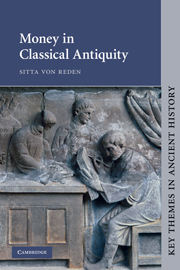Book contents
- Frontmatter
- Contents
- List of figures and tables
- List of maps
- Preface and acknowledgements
- Greek and Roman monetary system and coin denominations
- List of abbreviations
- Maps
- Introduction
- 1 Monetization: issues
- 2 Monetization: cases
- 3 Monetary networks
- 4 Cash and credit
- 5 Prices and price formation: issues
- 6 Prices and price formation: a case study
- 7 Sacred finance
- Epilogue: monetary culture
- Appendices
- Glossary
- Bibliographical essay
- References
- Index
4 - Cash and credit
Published online by Cambridge University Press: 05 August 2012
- Frontmatter
- Contents
- List of figures and tables
- List of maps
- Preface and acknowledgements
- Greek and Roman monetary system and coin denominations
- List of abbreviations
- Maps
- Introduction
- 1 Monetization: issues
- 2 Monetization: cases
- 3 Monetary networks
- 4 Cash and credit
- 5 Prices and price formation: issues
- 6 Prices and price formation: a case study
- 7 Sacred finance
- Epilogue: monetary culture
- Appendices
- Glossary
- Bibliographical essay
- References
- Index
Summary
INTRODUCTION
The largest maritime loan known from Athens in the fourth century bc is 4,900 drachmas. The largest maritime loan attested in Roman Alexandria in the second century ad was equivalent to 1.75 million Attic drachmas. Pasion, the richest banker in classical Athens, is said to have had 300,000 drachmas on loan, which was by the standards of his time an enormous sum (Dem. 36.5). But Seneca in the second century ad allegedly had just in one province an equivalent of 10 million drachmas (40 million sesterces) in debt claims (Dio 62.2.1; cf. 61.10.3). Not only had the ancient economy expanded over the 600 years between the classical Greek and Roman imperial periods, but the financial resources that supported such expansion had also grown. In this chapter we will investigate the changing financial capacity of the ancient monetary economy, looking in particular at credit and other strategies that were adopted to increase the money supply.
For most of the last century scholars have insisted that the ancient economy was both dominated and limited by the use of cash. ‘Money was coin and nothing else’, Finley wrote in the Ancient Economy, and similar were the assumptions of leading historians of the Roman economy. Legal historians regarded it as a fundamental principle that sale was an exchange of goods for cash and that an equivalent to the consensual contract, which constitutes an enforceable agreement without the immediate exchange of goods for money, was unknown until the Roman period.
- Type
- Chapter
- Information
- Money in Classical Antiquity , pp. 92 - 124Publisher: Cambridge University PressPrint publication year: 2010

